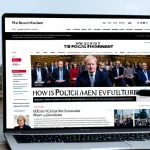Approaches to Measuring the Impact of UK Sports on National Identity
When measuring impact of UK sports on national identity, employing both quantitative and qualitative analytical methods is essential for a well-rounded approach. Quantitative frameworks rely on numerical data to give a measurable picture, such as survey results or participation statistics. Meanwhile, qualitative approaches dive into personal experiences, cultural expressions, and media narratives which better capture the deeper emotional and symbolic connections between sport and identity.
Key theories linking sport and national identity emphasize how sport serves as a powerful vehicle for expressing collective identity and belonging. Social identity theory, for example, explains how individuals derive part of their self-concept from membership in a national sporting community. Nationalism theories further elaborate on how sport rituals and symbols bolster feelings of unity and pride on a national scale.
Also read : How Does Participation in Sports Contribute to Community Building in the UK?
Selecting reliable indicators and robust data sources is crucial. Indicators might include media coverage volume, expressions of public sentiment, or observable national rituals at sporting events. Data sources need to be diverse, covering surveys, broadcast data, ethnographic observations, and historical records to avoid bias and achieve comprehensive coverage. The intersection of these varied methods helps overcome challenges inherent in capturing the complex influence of UK sports on national identity.
Quantitative Methods for Assessment
Quantitative analysis is a foundational approach for measuring impact of UK sports on national identity by employing structured data collection techniques that produce numerical evidence. Surveys are frequently used to gauge public opinion, capturing attitudes towards major sports events and how these shape feelings of national pride. For example, national surveys can reveal shifts in identity expression before and after high-profile matches, allowing researchers to statistically assess sports’ influence.
Additional reading : What is the economic impact of major UK sports events?
Statistical methods further analyze participation rates and audience engagement, offering clear metrics on how deeply sports embed themselves in society. Tracking attendance figures, television viewership, and social media interactions provides measurable indicators of national involvement and enthusiasm. Combining demographic data—age, region, ethnicity—with behavioural patterns helps identify which segments of the population most strongly associate UK sports with national identity.
Data collection in this domain must emphasize rigor and representativeness to avoid skewed results. Repeated surveys conducted over time enable trend analysis, showing how national identity linked to sports evolves. The precision of quantitative methods lies in their ability to produce replicable, objective findings, which support policymakers and researchers in understanding the societal impact of sport beyond anecdotal evidence.
Qualitative Approaches and Sociological Analysis
Exploring the impact of UK sports on national identity through qualitative research illuminates deeper cultural and social dynamics that quantitative data alone cannot capture. This approach relies on sociological studies and ethnographic methods to understand how individuals and communities experience sports in ways that shape a collective sense of identity.
One key technique is conducting in-depth interviews and focus groups with fans, athletes, and other stakeholders. These conversations reveal personal narratives and emotions tied to sporting traditions, providing insights into how sporting events reinforce feelings of belonging. For example, interviews with football supporters often highlight how match-day rituals affirm group cohesion and patriotic pride.
Ethnographic case studies are another essential tool. Researchers observe behaviors and interactions at sporting events or within fan communities to analyze cultural expressions connected to national symbolism. These studies offer rich descriptions of ceremonies, chants, and social practices that manifest the lived experience of national identity in the sports context.
Media and narrative analysis also play a critical role in qualitative approaches. Examining how sports stories are represented in television broadcasts, newspapers, and social media helps researchers understand the construction and dissemination of national identity. Narrative frames often emphasize themes of heroism, cultural heritage, and unity, which reinforce nationalistic sentiments around sports.
Together, these analytical methods provide a nuanced, contextualized picture of the profound links between sports and identity, complementing quantitative measures by highlighting subjective meanings and cultural significance. Recognizing the value of qualitative research ensures a comprehensive assessment of sport’s role in shaping UK national identity.
Scholarly Research and Theoretical Frameworks
Scholarly research is fundamental for measuring impact of UK sports on national identity, as it grounds analysis within established theoretical frameworks. Academic studies consistently apply social identity theory to explain how individuals align themselves with national sporting teams, viewing this affiliation as a source of pride and belonging. This theory posits that people derive part of their self-concept from membership in social groups, including sports communities bound to national identity.
Moreover, nationalism theories critically illuminate how sport functions as a stage for expressing collective narratives and cultural heritage. Researchers highlight that sporting events act as modern rituals reinforcing national unity, where symbols and ceremonies evoke emotional attachments linking sports to broader nationalist sentiment. These frameworks clarify why sport resonates so strongly with audiences across the UK, enhancing collective identity beyond mere entertainment.
Peer-reviewed literature frequently discusses how these theoretical approaches intersect, emphasizing the role of sport as both a reflection and constructor of national identity. For instance, studies have examined the ways in which media portrayals of UK sports teams shape public perceptions, reinforcing identities through hero narratives and cultural symbolism. This scholarly work provides robust evidence that sport’s societal impact must be assessed through multiple academic lenses to fully capture its complexity.
In sum, integrating academic studies and theoretical frameworks enriches our understanding by revealing the underlying social mechanisms at play. This approach supports more precise and insightful analysis compared to relying solely on descriptive or anecdotal data, making it essential for thorough research into how UK sports shape national identity.
Indicators and Challenges in Measuring Impact
Measuring the impact of UK sports on national identity requires carefully chosen indicators that reflect both quantitative and qualitative dimensions. Common indicators include the extent of media coverage, levels of public sentiment expressed in surveys or social media, and observable symbolic rituals during sporting events that evoke national pride. These provide tangible ways to gauge how closely sports relate to feelings of collective identity.
However, researchers face several measurement challenges. One major difficulty is addressing inherent biases in self-reported data or media portrayals, where enthusiasm or skepticism about sports may skew responses. For instance, survey participants may overstate national pride during major tournaments, inflating apparent impact. Similarly, media narratives tend to emphasize heroic or unifying stories, which can obscure more complex or contested identities.
Another challenge lies in capturing the subjectivity of identity expressions, which are often deeply personal and culturally embedded. Quantitative data alone may miss nuanced meanings behind rituals or fan behaviors, while purely qualitative studies risk lacking generalizability. Ensuring the reliability of data sources is critical—this means validating surveys for representativeness, triangulating findings across multiple methods, and critically evaluating ethnographic observations.
Limitations also arise from temporal and regional variations. National identity influenced by sports can fluctuate with successes or failures and may differ between England, Scotland, Wales, or Northern Ireland. This complexity demands flexible measurement frameworks that incorporate diverse indicators sensitive to context.
In sum, while indicators like media volume, public sentiment, and national sports rituals are essential, scholars must navigate limitations and biases continuously. Employing mixed analytical methods and robust data validation is key to producing accurate assessments of UK sports’ impact on national identity.
Indicators and Challenges in Measuring Impact
Measuring impact of UK sports on national identity relies heavily on selecting precise indicators that capture both observable and intangible effects. Core indicators include levels of media coverage, expressions of public sentiment from surveys or digital platforms, and the presence of symbolic rituals at sporting events that visibly express national pride. These indicators offer tangible evidence to assess how sports influence collective identity but require careful interpretation to avoid overstating effects.
One major measurement challenge is mitigating biases inherent in self-reported data and media portrayals. For example, survey respondents might amplify feelings of national pride during major tournaments, inflating the perceived strength of sports-related identity. Likewise, media often frames sports narratives heroically, emphasizing unity while potentially sidelining dissenting or complex identity expressions. These biases necessitate critical scrutiny of data sources to ensure accurate impact measurement.
Another difficulty arises from the subjectivity inherent in identity experiences. Quantitative data may fail to capture nuanced cultural meanings embedded in rituals or fan behaviors, while qualitative insights risk lacking broad applicability. Researchers therefore employ mixed analytical methods to triangulate findings, combining indicators like media analysis with ethnographic observations to provide a multidimensional understanding.
Reliability concerns extend to temporal and regional variability. National identity influenced by sports fluctuates over time and differs across England, Scotland, Wales, and Northern Ireland, posing challenges for static measurement frameworks. Addressing these requires flexible models sensitive to context and able to integrate diverse data streams.
In sum, carefully choosing indicators—such as media presence, public sentiment metrics, and national sporting rituals—and rigorously addressing challenges like bias, subjectivity, and regional differences are critical for credible measurement of the impact of UK sports on national identity.
Approaches to Measuring the Impact of UK Sports on National Identity
Measuring impact of UK sports on national identity requires a balanced use of both quantitative and qualitative analytical methods to capture the full spectrum of sports’ influence. Quantitative analysis primarily provides measurable data, such as survey results and participation statistics, enabling researchers to track changes in public attitudes and behaviors related to national identity. Surveys, for instance, help quantify how sporting events affect collective pride, while statistical methods analyze audience engagement through metrics like attendance and viewership.
Qualitative research complements these findings by exploring deeper cultural and symbolic meanings tied to sports. Techniques such as ethnographic studies and in-depth interviews uncover how fans and athletes personally experience national identity through rituals and narratives. Media content analysis further demonstrates how sports stories shape public perceptions and reinforce collective identity.
Key theoretical foundations support these methods. Social identity theory explains individuals’ affinity for national teams as part of their self-concept, while nationalism theories articulate how sporting rituals act as modern expressions of cultural unity. These theories guide the selection of appropriate indicators, such as levels of media coverage, expressions of public sentiment, and nationalistic rituals observed in sporting contexts.
Reliable data sources underpin all these processes. Combining diverse forms of evidence—from ethnographic observations and historical records to surveys and broadcast data—ensures comprehensive capture of how UK sports contribute to national identity. Addressing potential biases and validating data are essential steps to maintain accuracy in measuring this complex social phenomenon.





